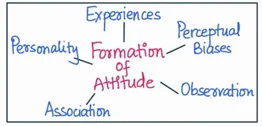Answer:
| Approach:
Introduction
- Write about the attitude.
Body
- Mention the factors affect the formation of a person’s attitude towards social problems
- Explain contrasting views of the caste system in our society.
Conclusion
- Write the suggestion and way forward.
|
Introduction:
The formation of a person’s attitude towards social problems can be influenced by several factors, including personal experiences, cultural and societal norms, education, and media exposure.

Body:
Factors affecting the attitude of person:-
- Personal experiences with a social problem, such as poverty or discrimination, can shape an individual’s attitude towards the issue.
- Cultural and societal norms, such as beliefs about gender roles or racial hierarchy, can also influence attitudes towards social problems.
- Education and media exposure can also play a role in shaping attitudes by providing information and different perspectives on social issues.
- In our society, contrasting attitudes are prevalent about many social problems, including the caste system.
Attitude with respect to caste system:
Traditionalist Attitude:
- Emphasis: Upholding traditional caste-based hierarchy.
- Explanation: Some individuals adhere to the belief that the caste system is an integral part of Indian culture and social order. They may view caste as a necessary division of labor and consider preserving caste-based practices as essential for social stability.
- Example: Certain conservative caste-based organizations, like the Karni Sena in Rajasthan, have vehemently opposed inter-caste marriages and actively worked to preserve caste-based divisions.
Progressive Attitude:
- Emphasis: Advocating for caste equality and social justice.
- Explanation: Many individuals and groups recognize the caste system as a discriminatory and oppressive social structure that perpetuates inequality. They seek to challenge and dismantle the caste-based hierarchy, promoting social integration and equal opportunities for all.
- Example: Dalit rights activist and lawyer, Bezwada Wilson, co-founded the Safai Karmachari Andolan, an organization dedicated to eradicating manual scavenging and challenging caste-based discrimination.
Mixed Attitude:
- Emphasis: Acknowledging the existence of caste but advocating for reform.
- Explanation: Some people acknowledge the historical significance and persistence of the caste system but argue for its reform rather than complete elimination. They may advocate for social reforms, reservation policies, and efforts to promote caste-based inclusivity and inter-caste interactions.
- Example: Prominent economist and Nobel laureate Amartya Sen argues for the need to address social inequality through policies that promote social justice while acknowledging the historical significance and complexity of the caste system in India.
Conclusion:
In conclusion, the formation of attitudes towards social problems is complex and influenced by various factors. Contrasting attitudes towards the caste system in Indian society can be attributed to the influence of cultural and societal norms, personal experiences, and education. It is essential to promote education and awareness to address social problems and promote a more equitable and just society.
